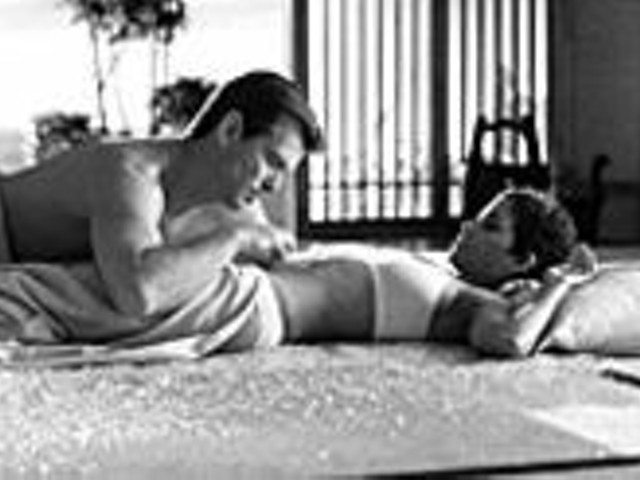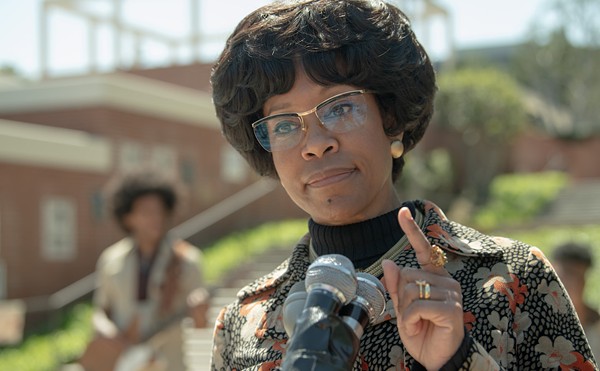Now, this is a common ploy in what has come to be crudely known as the "chick flick." But most examples of that frequently exploitative genre (get outta here, Banger Sisters et al) do not boast the services of actresses as focused as Kyra Sedgwick, Parker Posey and Fairuza Balk, and almost none of them can claim an intelligence so fine as that of writer/director Miller. But then, this emerging filmmaker's pedigree speaks volumes. The daughter of America's most distinguished living playwright, Arthur Miller, she has proved unfailingly literate and unmistakably original in her short stories (three of them are adapted here) and her movie work, which also includes 1995's unsung Angela. Rebecca Miller may not yet have created her own Death of a Salesman or Crucible, but no one will be surprised when she does.
For now, Personal Velocity reveals a vivid and sympathetic spirit at work in the fields of womanhood. In the first story, "Delia," Sedgwick plays a brooding, wounded wife trapped in a nightmarish trailer-park marriage in upstate New York. Constantly abused by her vile husband and committed to healing her traumatized young children, Delia finally summons up the courage to leave, first taking silent refuge in a women's shelter, then asking a startled former high-school acquaintance (Mara Hobel) to take her in. Delia's prospects aren't good -- she's got no education and no cash. But she's full of spiky pride, and when she takes a thankless job as a diner waitress, she shows an unerring instinct for the one source of strength available to her: While spending her miserable teenage years tending to her dying father, she became the high school slut, which gave her a strange power over her tormentors. Now, more than ever, Delia needs the comfort of identity, and Miller and Sedgwick manage to transform her sullen cynicism into a victory of wit over circumstance.
As a writer, Miller has certainly found her own voice, but admirers of her father's work will likely find here an echo of his crucial obsession with personal and social morality. Most of that arises in the characters, some of it from the ironic, observant voice of her narrator (John Ventimiglia), who turns what might be intrusion into wry illumination.
The second vignette, "Greta," is set among Manhattan's tony literary set, an atmosphere not unknown to our Ms. Miller. The self-absorbed protagonist, played by the reigning queen of indie-flick actresses, Parker Posey, is a floundering editor of cookbooks with some troubling issues on her back burners. She reviles her famous lawyer father (Ron Leibman) because he betrayed her dead mother. Greta dropped out of Harvard Law and married a handsome but rudderless magazine fact-checker (Tim Guinee) to spite Dad. Most significantly, she can't seem to repress her own urges to infidelity, which are somehow tied to ambition. When Greta's obscure career is suddenly lifted by her work (and play) with a popular Asian novelist (Joel de la Fuente), she gets her epiphany, too -- one starched with Miller's dark humor: "She was going to dump her beautiful husband like a redundant paragraph."
In "Paula," a more empathetic (if less satiric) piece of business, the exotic-looking Fairuza Balk is a punkish runaway with a pregnancy problem, a Haitian boyfriend back in Brooklyn and an obvious aversion to facing facts. Wary and streetwise, this goth-painted wanderer is, like her two predecessors, looking for identity and independence. Miller opens the door for her through an ancient device -- she picks up a hitchhiker.
For Paula, who's driving in a daze through the upstate countryside en route to her alienated mother's place, fifteen-year-old Kevin (Lou Taylor Pucci) is the mirror of her own uncertainties (he's been badly beaten and is on the run) and the prod for her best instincts as a human being. If the baby growing inside this confused young woman is, in her view, "sucking the seconds out of her life," her fleeting encounter with a boy even more traumatized than she is turns her around. Paula's moment of truth is the most obvious one in a movie that has three of them, and because of that the third sketch comes off as the bluntest and least artful. But that compromises neither's Miller's integrity nor the vigor of her storytelling. Moviegoers bewailing the absence of literacy and shallowness of character they usually get for their seven bucks need look no further than this fluent and satisfying triptych for a source of hope.





